Overview
Introduction: How To Treat Dog Ear Infection Without Vet
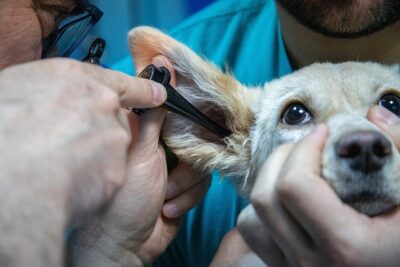
Embarking on the journey of pet ownership fills our lives with joy, but the moment Fido begins incessantly scratching those ears, it’s a signal to pay close attention.
Recognizing the signs of potential ear infections, understanding the nuances of dog ear infection, and delving into the complexities of the ear canal are essential for ensuring the ongoing health and happiness of our furry companions.
In this exploration, we’ll uncover common causes, symptoms that may indicate a dog ear infection, and the importance of using a gentle method like a cotton ball for proper care.
Moreover, we’ll also delve into effective ways of addressing these concerns without a vet, emphasizing ‘how to treat dog ear infection without vet.’ This proactive approach ensures that as responsible pet owners, we can actively contribute to our pets’ well-being by utilizing home-based remedies and preventive practices.
Understanding Common Causes of Dog Ear Infections
Dog ear infections often stem from moisture, allergies, or trapped debris. Knowing the triggers helps in prevention and swift intervention. Whether it’s the ear canal or the dog’s ear flap, understanding the root cause is vital.
Additionally, responsible pet owners should familiarize themselves with effective home remedies and ‘how to treat dog ear infection without vet,’ ensuring proactive care and early intervention for their furry companions.
Importance of Timely Treatment
Taking swift action is crucial when it comes to your furry friend’s ear health. Delayed treatment can lead to discomfort, pain, and even hearing loss. Learn about the development of ear infections, especially chronic and severe cases, and explore effective treatments for dog ear infections.
In this comprehensive guide, we’ll delve into natural remedies for ear infections and strategies to address common issues such as ear mites. As a responsible pet parent, understanding the nuances of inner ear infections is vital, and you’ll gain insights on caring for your dog’s ears with the right information. Join us on this journey to discover how to treat dog ear infection without vet, ensuring your canine companion’s ears stay happy and healthy.
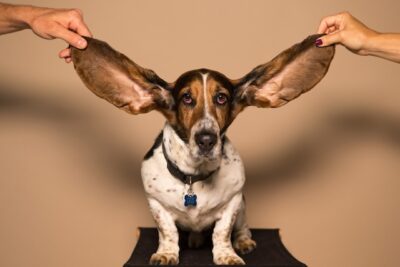
Identifying Symptoms
In the realm of pet care, recognizing the early signs of dog ear infections is pivotal, empowering pet parents to provide targeted care and ensure the well-being of their furry friends.
Recognizing Early Signs: A Vigilant Eye for Symptoms
Watchful observation is key to spotting early signs of potential dog ear infections. Be attuned to signals such as excessive scratching, head shaking, or the presence of foul odors emanating from your dog’s ears.
These early indicators serve as crucial cues that prompt timely intervention, preventing the escalation of ear issues.
Differentiating Types of Infections: Knowledge for Effective Treatment
Understanding the nuances between bacterial, fungal, and yeast infection is vital for tailoring effective treatment strategies. Each type of infection demands a specific approach, making accurate differentiation essential.
By discerning the distinctive characteristics of these infections, pet parents can embark on a targeted treatment plan that addresses the root cause.
Examining prevalent varieties of dog’s ear infections
- Bacterial Infection: Recognized by redness, swelling, and potential discharge, bacterial infections in a dog’s ear can lead to discomfort and require specific antibacterial treatments.
- Fungal Infection: Fungal ear infections, often caused by yeast, manifest with itching, redness, and a characteristic musty odor. Understanding the underlying fungal nature is crucial for effective intervention.
- Yeast Infection: Yeast infections can lead to smelly ears, itchiness, and inflammation. Identifying these symptoms is paramount for administering targeted care and preventing recurrence.
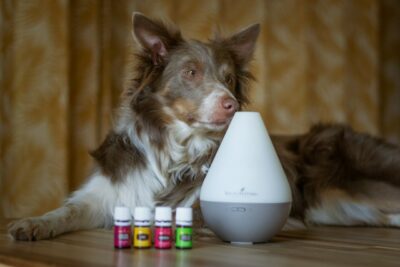
Preventing Recurring Ear Infections: A Holistic Approach
Pet parents can take a holistic approach to prevent recurring ear infections in their dogs. Regular cleaning of your dog’s ears, ensuring they stay dry, and employing natural remedies can contribute to maintaining ear health.
Understanding the significance of a clean ear canal, especially for dogs prone to chronic ear infections, becomes a proactive measure in pet care. Furthermore, exploring ‘how to treat dog ear infection without vet’ becomes essential for responsible pet owners, emphasizing the importance of differentiating between bacterial, fungal, and yeast infections for effective home treatment.
Home Treatment with Natural Remedies: How To Treat Dog Ear Infection Without Vet
Taking a home treatment approach ensures a comprehensive plan for maintaining your dog’s ear health, incorporating both natural remedies and over-the-counter solutions to address a range of concerns.
Natural Remedies: Gentle Solutions from Nature’s Arsenal
- Tea Tree Oil Drops: Unlock the power of tea tree oil, celebrated for its antifungal and antibacterial properties. Dilute it for safe application in your dog’s ears, providing a natural remedy to combat infections effectively.
- Apple Cider Vinegar Rinse: Restore your dog’s ear to its natural pH balance with an Apple Cider Vinegar (ACV) rinse. A mix with water allows for a gentle cleansing of your pup’s ears, creating an environment less conducive to infection.
- Coconut Oil Applications: Harness the natural anti-inflammatory benefits of coconut oil to soothe irritation when applied to your dog’s ears. This holistic approach offers comfort and relief, particularly for inflamed ears.
Over-the-Counter Solutions: Convenience Meets Effectiveness
- Antifungal Ear Drops: Address infections conveniently with over-the-counter drops containing antifungal agents. These targeted drops provide an effective solution for combatting fungal infections in your dog’s ears.
- Hydrocortisone Creams: Alleviate inflammation and itching with readily available hydrocortisone creams. These creams are a go-to solution for soothing irritated skin inside the ear, ensuring your dog’s comfort.

Cleaning and Maintenance: Fundamental Practices for Healthy Ears
Maintaining Clean Ears: Understand the significance of maintaining clean ears in preventing infections and promoting overall ear health. Establishing a regular cleaning routine is pivotal for pet parents committed to their dog’s well-being.
Safe Ear Cleaning Techniques: Utilize gentle cleansers and techniques to avoid irritation and potential damage to your dog’s sensitive ears. The use of safe cleaning practices is foundational to maintaining healthy ears.
Importance of Regular Inspection: A Proactive Approach to Well-Being
Regular Inspection: Cultivate a habit of regularly inspecting your dog’s ears as a proactive measure for early issue detection and prevention of complications. This vigilant approach ensures timely intervention and supports your dog’s overall ear health.
Holistic Approaches and Preventive Measures: Nurturing Well-Rounded Well-Being
Explore holistic alternatives and preventive measures to complement traditional treatments. Consider aspects such as gut health, immune support, and the use of essential oils like green tea to prevent infections and promote your dog’s holistic well-being.
By integrating natural remedies, over-the-counter solutions, and essential cleaning and maintenance practices, you create a comprehensive home treatment plan. This approach not only addresses existing concerns but also establishes a foundation for ongoing preventive care, nurturing the optimal ear health of your beloved canine companion.

Dietary Adjustments for Optimal Ear Health
Understanding the profound impact of diet on ear health is essential for pet owners seeking holistic approaches to address concerns. Additionally, incorporating supplements can provide a boost to your dog’s immune system, contributing to overall well-being.
Impact of Diet on Ear Health: A Holistic Perspective
Certain foods can contribute to inflammation, affecting your dog’s ear health. Opting for a balanced diet that includes essential nutrients supports overall health, fostering an environment less prone to infections.
Incorporating Supplements: Enhancing Immune Function
Explore the benefits of supplements, such as omega-3 fatty acids, known for their anti-inflammatory properties. These supplements can aid in reducing inflammation and promoting optimal ear health, offering a proactive approach to well-rounded pet care.
Avoiding Common Pitfalls: Lessons for Responsible Pet Ownership
Embarking on the journey of pet ownership brings joy but entails responsibilities, especially when addressing health issues like ear infections. Knowing how to treat dog ear infections without a vet is crucial for responsible pet owners, involving early detection of symptoms, gentle cleaning with methods like a cotton ball, regular maintenance, and consulting professionals for severe cases.
Avoiding common pitfalls in responsible pet ownership includes a balanced diet, consideration of the living environment, and patience with home treatments. By adopting these lessons, pet owners contribute to the well-being of their furry companions, ensuring a happy and healthy life together.
Overuse of Medications: Balancing Treatment Approaches
Overusing ear medications can lead to resistance, diminishing their effectiveness. Adhere to guidelines to avoid complications, striking a balance between treatment and prevention.
Maintaining a Healthy Environment: The Role of Cleanliness
A clean living space plays a pivotal role in preventing recurring ear infections. Regular cleaning practices and creating a comfortable environment contribute to the overall well-being of your furry friend.
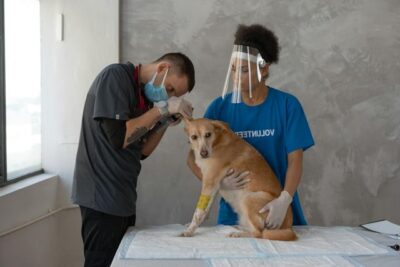
Seeking Professional Advice: Knowing When to Consult a Vet Remotely
Recognize the limits of home treatment and understand when it’s time to seek professional advice remotely. Teleconsultations provide expert guidance without the stress of a physical vet visit, ensuring timely intervention.
When Home Treatment Isn’t Enough: Addressing Persistent Symptoms
Persistent symptoms necessitate professional intervention. Understand the signs that home treatment may not be sufficient and be proactive in seeking professional help to address ongoing concerns effectively.
Consulting with a Vet Remotely: Accessing Expertise Stress-Free
Teleconsultations offer a stress-free way to access veterinary expertise. Learn about the benefits of remote consultations, providing valuable insights and guidance for your dog’s specific needs.
Additional Insights for Responsible Pet Owners:
- Notice Symptoms Promptly: Stay vigilant and promptly notice any symptoms of ear issues, ensuring timely intervention.
- Avoid Unverified Remedies: Exercise caution with home remedies like hydrogen peroxide or rubbing alcohol, as they may cause more harm than good.
- Gentle Massage Techniques: Incorporate gentle massage techniques to soothe your dog and aid in the absorption of topical medications.
- Understanding Inner Ear and Ear Drum Health: Recognize the importance of inner ear and ear drum health in maintaining overall ear function.
By delving into dietary adjustments, supplement incorporation, and responsible pet ownership practices, you create a holistic framework for promoting your dog’s ear health.
This comprehensive approach not only addresses existing concerns but also establishes preventive measures for long-term well-being.
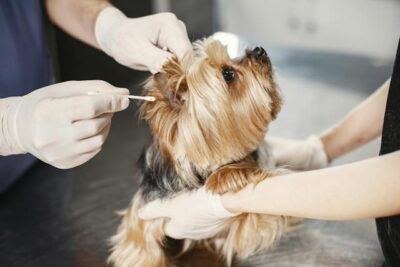
Proactive Prevention Strategies for Optimal Dog Ear Health
Empower yourself with proactive measures to safeguard your dog’s ear health through effective prevention strategies.
Regular Grooming Practices: A Holistic Approach
Engage in regular grooming practices as a cornerstone for your dog’s overall well-being, encompassing vital aspects like ear health.
Grooming not only enhances your dog’s appearance but also plays a pivotal role in preventing potential ear issues.
Ear Inspection Routines: Early Detection Matters
Incorporate routine ear inspections into your pet care regimen. Early detection of potential issues is crucial, allowing for timely intervention and mitigating the risk of more severe complications.
Staying Updated on Latest Findings: A Continuous Learning Journey
Stay informed about the latest findings in home treatments, ensuring that your approach to caring for your dog’s ears remains optimized.
Ongoing advancements provide opportunities to enhance care practices continually.
Latest Findings in Home Treatments: Embracing Advancements
Embrace advancements in home treatments as they unfold. Stay updated on emerging solutions and best practices, providing the best possible care for your canine companion.
Knowledge Is Power: Stay Informed for Well-Informed Care
Recognize that knowledge is power when it comes to your dog’s health. Stay informed about various aspects, from preventive measures to recognizing symptoms promptly, ensuring your furry friend remains a happy and healthy companion.
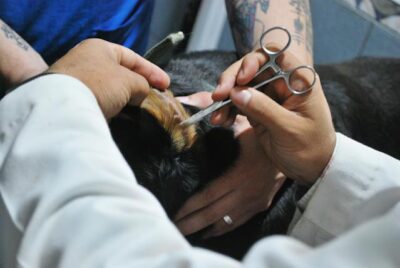
Conclusion: How To Treat Dog Ear Infection Without Vet
In summary, acquiring expertise in home treatment strategies empowers you, a responsible pet owner, to offer optimal care for preventing ear infections in your dog. By remaining proactive, well-informed, and actively involved in preventive practices, you contribute to the overall well-being of your furry family member. Specifically, understanding ‘How To Treat Dog Ear Infection Without Vet’ is crucial.
This includes seeking remedies for dog ear health, addressing issues like yeast, preventing severe infections, and supporting their immune system. Many pet parents find home remedies, including the use of a cotton ball and anti-inflammatory medications, effective in managing chronic infections and providing topical relief. For more comprehensive dog and puppy care tips, you can explore our blog, dedicated to enhancing the well-being of your furry companions.
Additional Insights for Responsible Pet Owners:
- Notice Symptoms Promptly: Vigilance in noticing symptoms promptly enhances your ability to address issues early.
- Caution with Home Remedies: Exercise caution with home remedies such as hydrogen peroxide or rubbing alcohol, seeking professional advice when needed.
- Gentle Massage Techniques: Incorporate gentle massage techniques as part of your care routine, promoting relaxation and aiding in the application of topical medications.
- Holistic Approach: Embrace a holistic approach to your dog’s well-being, considering factors like gut health, immune support, and the use of essential oils for overall health.
Keep in mind that responsible pet care plays a pivotal role in nurturing a thriving and content furry family member. Discovering how to treat dog ear infection without vet is an integral part of being a responsible pet owner.
FAQs How To Treat Dog Ear Infection Without Vet
1. Can I use hydrogen peroxide or rubbing alcohol to treat my dog’s ear infection at home?
- While these are commonly suggested home remedies, it’s crucial to exercise caution. Consult with a vet before attempting to use hydrogen peroxide or rubbing alcohol, as improper use may exacerbate the issue.
2. Are there natural alternatives to traditional medications for treating ear infections?
- Yes, some natural alternatives, such as essential oils and green tea, are suggested. However, it’s essential to consult with a holistic veterinarian for guidance on their safe and effective use.
3. Can I clean my dog’s ears at home to prevent infections?
- Regular ear cleaning is a preventive measure, but it’s crucial to use appropriate techniques and solutions. Consult your vet for safe cleaning practices tailored to your dog’s specific needs.
4. What are the signs of a dog ear infection, and how can I notice them early?
- Signs include excessive scratching, head shaking, foul odors, and redness. Regularly inspect your dog’s ears for these symptoms and seek professional advice if noticed.
5. Does a gentle ear massage provide benefits in treating dog’s ear infections?
- Gentle massage can aid in the application of topical medications. However, consult your vet before incorporating massage into the treatment plan to ensure it’s suitable for your dog’s condition.
6. Can environmental allergies contribute to dog ear infections?
- Yes, environmental factors like allergies may play a role. It’s essential to address the root cause and consult with a vet to develop a holistic treatment plan.
7. What should I do if my dog has floppy ears that are prone to infections?
- Regular cleaning and inspection are crucial for floppy-eared breeds. Consult your vet for specific care routines to prevent infections in dogs with floppy ears.
8. How can I prevent recurring ear infections in my dog?
- Maintaining a clean living environment, regular ear inspections, and a balanced diet are preventive measures. Discuss specific prevention strategies with your vet.
9. Are there over-the-counter medications for dog ear infections, and are they effective?
- Some over-the-counter drops may contain antifungal agents. However, their effectiveness varies, and it’s advisable to consult with a vet before using them.
10. Can untreated ear infections lead to facial paralysis in dogs?
- In severe cases, untreated ear infections may lead to complications like facial paralysis. Timely intervention and professional advice are crucial for preventing such complications.
11. Can an untreated ear infection lead to more severe complications, and how can I prevent this?
- Yes, untreated ear infections can progress to severe issues like otitis interna. Regular check-ups and early intervention are crucial to prevent complications.
12. What role does the ear canal play in preventing dog ear infections?
- The ear canal’s anatomy influences the likelihood of infections. Learn about proper cleaning techniques and discuss preventive measures with your vet.
13. Are there specific symptoms indicating chronic ear infections in dogs?
- Chronic ear infections may manifest as persistent itching, foul odors, and recurring redness. Consult with your vet for a comprehensive understanding and tailored treatment.
14. How effective is brewed green tea as a natural remedy for dog ear infections?
- Some pet parents use brewed green tea for its potential antibacterial properties. However, consult with your vet before incorporating it into the treatment plan.
15. Can grass seeds contribute to ear infections in dogs, and how can I prevent this?
- Grass seeds can lead to irritation and infections. Regularly inspect your dog’s ears, especially after outdoor activities, to prevent potential issues.
16. What is the difference between otitis externa and otitis media in dog ear infections?
- Otitis externa involves the external ear canal, while otitis media extends to the middle ear. Understanding these differences is vital for accurate diagnosis and treatment.
17. Is gentle massage suitable for all dogs with ear infections, or are there exceptions?
- Gently massage can play a role in treatment, but it’s crucial to consider both the dog’s comfort and the severity of the infection. Rely on your vet for personalized guidance in this matter.
18. How can pet parents ensure their dog’s ears stay clean as a preventive measure?
- Regular cleaning with vet-approved methods is key to keeping a dog’s ears clean. Establish a routine based on your dog’s breed and susceptibility to infections.
19. Are there common home remedies for most ear infections in dogs?
- Home remedies like natural oils and solutions may offer relief, but their effectiveness varies. Consult with your vet to determine the most suitable remedy for your dog.
20. Can bacterial infection in dog ears be effectively treated at home, or is professional intervention necessary?
- While some bacterial infections may respond to home treatments, severe cases often require professional intervention. Recognize signs early and consult with your vet promptly.




